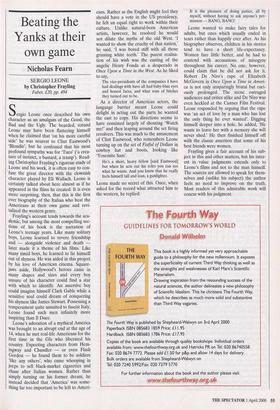Beating the Yanks at their own game
Nicholas Fearn
SERGIO LEONE by Christopher Frayling Faber, £20, pp. 494 Sergio Leone once described his own character as an amalgam of the Good, the Bad and the Ugly. The bearded, rotund Leone may have been flattering himself when he claimed that 'on his more careful side' he was nearest to Clint Eastwood's Slondie', but he confessed that his most profound sympathy was for `Tuco' Ca crea- ture of instinct, a bastard, a tramp'). Read- ing Christopher Frayling's rigorous study of Leone and his work, it is often easy to con- fuse the great director with the clownish character played by Eli Wallach. Leone is certainly talked about here almost as if he appeared in the films he created. It is even more surprising, then, that this is the first ever biography of the Italian who beat the Americans at their own game and revi- talised the western genre.
Frayling's account tends towards the aca- demic, but among the most compelling sec- tions of his book is the narration of Leone's teenage years. Like many solitary boys, Leone learned to revere friendship and — alongside violence and death later made it a theme of his films. Like many timid boys, he learned to lie himself out of shyness. He was aided in this project by his love of American cinema. Square- jaws aside, Hollywood's heroes came in many shapes and sizes and every boy unsure of his character could find a star with which to identify. An assertive boy could imagine himself Clark Gable while a sensitive soul could dream of conquering his shyness like James Stewart. Possessing a temperament quite unsuited to fascist Italy, Leone found such men infinitely more inspiring than Il Duce.
Leone's adoration of a mythical America was brought to an abrupt end at the age of 14, when he met real-life Americans for the first time in the GIs who liberated his country. Expecting characters from Hem- ingway and Chandler — or even Flash Gordon — he found them to be soldiers `like any others', who came whooping in jeeps to sell black-market cigarettes and chase after Italian women. Rather than simply turning on his former dream, he instead decided that 'America' was some- thing far too important to be left to Ameri- cans. Rather as the English might feel they should have a vote in the US presidency, he felt an equal right to work within their culture. Unlike natural-born American artists, however, he resolved he would not dilute the myths of the old West. 'I wanted to show the cruelty of that nation,' he said, 'I was bored stiff with all those grinning white teeth.' The purest realisa- tion of his wish was the casting of the angelic Henry Fonda as a desperado in Once Upon a Time in the West. As he liked to say,
The vice-presidents of the companies I have had dealings with have all had baby-blue eyes and honest faces, and what sons of bitches they turned out to be.
As a director of American actors, the language barrier meant Leone could delight in acting out the parts he wanted the cast to copy. His directions seems to have consisted largely of shouting 'Watch me!' and then leaping around the set firing revolvers. This was much to the amusement of Clint Eastwood, who remembers Leone turning up on the set of Fistful of Dollars in cowboy hat and boots, looking like `Yosemite Sam'.
He's a short, heavy fellow [said Eastwood] but when he acts out his roles you can see what he wants. And you know that he really feels himself tall and lean, a gunfighter.
Leone made no secret of this. Once, when asked for the record what attracted him to the western, he replied:
It is the pleasure of doing justice, all by myself, without having to ask anyone's per- mission — BANG, BANG!
Leone wanted to make fairy tales for adults, but ones which usually ended in tears rather than happily ever after. As his biographer observes, children in his stories tend to have a short life-expectancy. Women fare little better, and he had to contend with accusations of misogyny throughout his career. No one, however, could claim that he did not ask for it. Robert De Niro's rape of Elizabeth McGovern in Once Upon a Time in Ameri- ca is not only unsparingly brutal but curi- ously prolonged. The scene outraged audiences and critics alike and De Niro was even heckled at the Cannes Film Festival. Leone responded by arguing that the rape was 'an act of love by a man who has lost the only thing he ever wanted'. Digging himself deeper into a hole, he added, He wants to leave her with a memory she will never shed.' He then finished himself off with the classic assertion that some of his best friends were women.
Frayling gives a fair account of his sub- ject in this and other matters, but his inter- est in value judgments extends only to Leone's films and not to the man himself. The sources are allowed to speak for them- selves and (unlike his subject) the author feels no need to improve on the truth. Most readers of this admirable work will concur with his judgment.






















































































 Previous page
Previous page